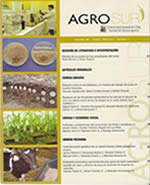Temporal organic matter content variation on of two volcanic soils under different agricultural managements
Main Article Content
Abstract
The aim of this study was to determine the relationship between the management system of agricultural residues and organic matter in two volcanic soils of Southern Chile. The soil samples were collected in areas where there are mixed of volcanic materials, and this was evaluated on the extractable aluminum content variability. When this parameter was related to soil organic matter content allowed us to confirm that the extractable aluminum is the most important index of the soil organic matter value, explaining organic matter level by more than 60% and suggesting that residues management would explain up to 40% of total organic matter content. No relation was found between extractable aluminum and exchangeable aluminum, or a correlation between organic matter content and mineral nitrogen in the soil samples.
In general, grassland management systems allow an accumulation of organic matter content and conversely, crops, mainly grain crops are more extractive management system since they use the nutrients and reduce the organic matter content of the soil. It was established that both the mineral nitrogen and soluble carbon not have a significant correlation with the levels of organic matter in the soil.

